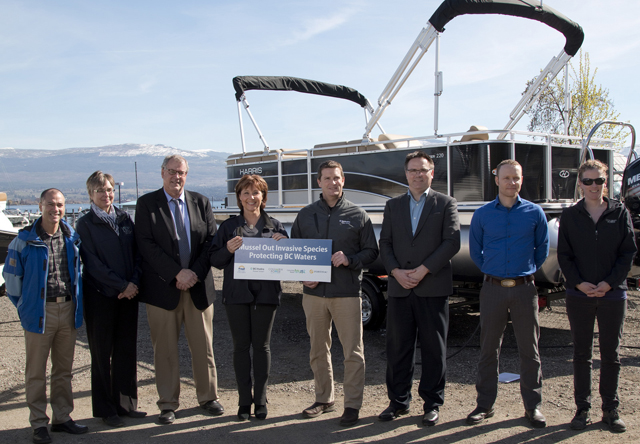Permanent stations to protect B.C. from invasive mussels
Following a successful pilot program in 2015, Premier Christy Clark announced Wednesday a $2 million boost to the province’s invasive mussel defence program that will see eight permanent mussel inspection stations installed at major entry points along B.C.’s borders.
“B.C. is leading the fight against invasive species,” said Premier Clark. “To date, no zebra or quagga mussels have ever been detected in B.C.’s waterways – and we’re going to keep it that way. Eight more inspection stations are yet another tool towards ensuring we remain mussel-free.”
Five inspection stations will be set up along the B.C.-Alberta border, and three along the B.C.-United States border.
The stations in the Columbia Basin will be near the communities of Golden, Radium, Sparwood, Castlegar and Valemount.
Quagga and zebra mussels pose a serious threat to B.C.’s aquatic ecosystems, salmon populations, hydro power stations and other infrastructure facilities.
They can clog pipes, cause ecological and economic damage, displace native aquatic plants and wildlife, degrade the environment and affect drinking water quality.
Thanks to the generous support from BC Hydro, FortisBC, Columbia Power and the Columbia Basin Trust, $2 million in funding will enhance the successful program and introduce more protection at B.C.’s borders.
The Province is also contributing in kind with staff, equipment and office space.
“Invasive mussels are a concern to BC Hydro and we applaud the Province for taking strong measures to protect B.C.’s rivers and lakes,” said Mark Poweska, vice president, Generation BC Hydro.
These stations will open for business Friday (April 1) for the 2016 boating season, operating 10 hours a day, seven days a week through to October.
In total, 32 conservation officers will work the stations, which will operate 10 hours a day, seven days a week from April through October. This is an increase of 20-crew members from last year’s pilot and an additional six mobile decontamination units are being added to the fleet of equipment.
The eight inspection stations will have the capability to become mobile if the need arises, travelling to locations throughout B.C. where watercrafts are being detained, waiting for decontamination.
The program will also consist of:
- Increased highway signage at permanent inspection station locations
- Expanded monitoring for quagga and zebra mussels
- Expanded Report All Poachers or Polluters response line coverage
- Increased opportunities to promote “Clean, Drain Dry” education and outreach activities
“FortisBC views environmental protection as an important part of creating a sustainable future for British Columbians,” said Jody Drope, vice president, Human Resources and Environment, Health and Safety, FortisBC.
The Invasive Mussel Defence pilot program was launched in 2015. During May-October 2015, over 4,300 boats were inspected, of which 70 were identified as coming from an invasive mussel infested province or state.
Out of these 70 watercrafts, 34 required decontamination and 15 were confirmed to be transporting invasive mussels or their larvae. Six were issued a 30-day quarantine order due to risk of live mussels.
“As with elsewhere in the province, lakes and rivers in the Columbia Basin region are an incredibly important asset, relied upon for everything from power generation to recreation and tourism to community water supply and irrigation,” said Neil Muth, Columbia Basin Trust president and chief executive officer.
“Keeping these waterways free from invasive mussels is essential and fits with our environmental goal of maintaining and enhancing the health of our aquatic ecosystems.”
The public is encouraged to report mussel-affected boats/equipment to the B.C. Conservation Officer Service’s Report All Poachers and Polluters (RAPP) hotline at 1 877 952-7277.
Find out more about quagga and zebra invasive mussel species and the environmental, economic and social impacts they pose to freshwater.

























Comments